- Home
- Stephanie Laurens
Royal Weddings: An Original Anthology Page 2
Royal Weddings: An Original Anthology Read online
Page 2
Would dare intrude on her morning’s race and ride her down.
And, damn it, win.
They were neck and neck, but with his horse a sliver of a nose ahead when they flashed past the post that marked the incipient end of the track.
Both of them drew up, straightening as they drew rein, then they turned their horses onto the thick grass to the side of the track, letting them slow to a walk.
She glanced at his horse. A massive chestnut hunter with, clearly, an unexpected turn of speed. Without meeting Gaston’s eyes, she asked, “Did you bring him with you?”
“No. I’d left him here. I’m going to take him home with me when I leave.”
“And how soon will that be?”
He hesitated, then said, “After the wedding. I can’t stay away much longer than that—my estates need fairly constant tending.”
She glanced at him then, trying to see past the easy charm she was aware was a mask. “I can’t imagine you as a farmer. Where’s home these days?”
He grinned. “Perigord, of course.”
She didn’t rise to the bait. “Where in Perigord?” She’d looked in the map book in her father’s library the previous evening. “Where’s your principal seat?”
“Theoretically a castle on the upper reaches of the Dordogne, but it’s drafty and cold in winter, so I live at a chateau not far from a town called Sarlat in Perigord Noir.”
She made a note to look it up. Why, she couldn’t have said.
Walking his chestnut alongside her gray, Gaston looked ahead, and seized the opening she’d inadvertently given him. “I have to get back because there’s no one I can trust with my holdings, not for too long. Oh, they have their hearts in the right place—it’s not their loyalty that limits me. But there is much to deal with, and they will become overwhelmed. They know to put off the harder decisions until I am back—so I must not stay away too long.”
She frowned. “I would have thought you would have married by now.” She glanced briefly at him. “A wife with a sound understanding could manage your estates, at least for a few months.”
“True.” He sighed. “But what with installing Louis, and helping sort out the chaos left in the aftermath of the Corsican’s downfall, and then, once I returned home, there was so much to do, I haven’t really had time to look for a wife.” He hesitated, then added, “Perhaps when I get back, now that everything is more or less stable again, I’ll be able to attend to the matter.”
She sniffed. “You make it sound like the equivalent of hiring a maid. That you just need to see the woman, interview her, weigh up her attributes, look at her references, and make up your mind. I suspect you’ll find it’s rather more complicated.”
He glanced sidelong at her, but she was looking ahead. “I heard about Beaumont. My condolences.”
She inclined her head. “It was a long time ago.”
“Not so long that you’ve found a replacement. Why is that?”
She shrugged. “I didn’t see the need. I had other activities to keep me amused.”
“Ah, yes—the weddings.”
“I’m good at it.” A touch of belligerence.
His lips curved. “Indeed. I saw. You are a general in charge of a motley troop, but you were in control and whipped us into line.” It was too good a chance to pass up. “Would that I could find a lady with the same skills to take charge of my household.”
She snorted. “The only one that lady would need to whip into line is you—and she’ll need the luck of the devil to succeed.”
“Vraiment? You wound me. But no, my lady would find I would be a willing partner, because, sadly, there’s rather more than my poor self she would have to deal with.”
He waited.
Waited.
They were nearly at the gate when Meg finally gave in to her curiosity and asked, “Who else?”
“My brothers. Did I tell you I have five of them? All much younger than me—my sisters lie between in age, but they are all married with their own households and unable to bear with the . . . well, they call them heathens.” He sighed deeply, but she knew him well enough to know he was smiling fondly, to detect the note of pride in his deep voice.
“I wish you luck in your courting, then.” Finally glancing at him, she met his gaze. “Clearly your brothers will be depending on you to do your duty and find them a sister-in-law of suitable mettle.”
And, yes, she saw it in his eyes. He was—truly was—looking at her.
Looking at her like a predator, waiting for her to run.
So he could pounce.
With a polite smile, she inclined her head, but she didn’t take her eyes off him. “I’m off home. I’ll see you tonight at the dinner.”
It was his turn to make a dismissive sound. “I’ll see you to your home.”
And he did. She knew him far too well to waste breath trying to dissuade him.
When, having watched him ride off from the front porch, she finally crossed the threshold and climbed the stairs, she told herself that she should put the conversation from her mind—that when that lurking twinkle shone in Gaston Devilliers’s eyes, only a ninnyhammer would believe anything that came out of his mouth.
The problem was, only when they’d been clattering down the streets and talking about inconsequential things had that teasing twinkle returned to his eyes.
June 16, 1820, 10:00 A.M.
Duc de Perigord’s suite, Bartholomew’s Hotel, London
“So!” Having changed out of his riding clothes, washed, and redressed in appropriate attire for a day about town, Gaston put the finishing touches to his cravat. In the mirror, he caught his valet Hubert’s gaze. “What’s next on my lady’s schedule?”
June 16, 1820, noon
Florist’s shop off Covent Garden, London
Meg opened the florist’s door and led the way in. Cicely followed; they’d come from Durham House in the carriage. The interior of the shop was thick with a heady mix of floral scents. Meg scanned the dimness.
Her gaze snagged on a pair of broad shoulders.
“Damn!” she muttered beneath her breath. Gaston had escorted Juliette and her mother to the meeting.
Going forward, feeling her lips set a touch grimly, she exchanged nods with the ladies, then turned to Gaston—
He captured her hand and bowed over it with his usual exquisite grace. “Lady Margaret.”
Lips tight, ignoring the sensation elicited by his fingers clasping hers so strongly, she inclined her head formally. “Monsieur le duc. Thank you for escorting the ladies. We won’t trouble you further.”
He met her gaze; his eyes were twinkling. “It is no trouble at all, I assure you.” He exchanged a glance with the vicomtesse. “I have agreed to give a masculine opinion on this matter of flowers.”
Gaston Devilliers and flowers. Meg could think of few less likely combinations, but . . . drawing in a breath, reminding herself that the wedding was only two days away and that after that he would be gone—once again gone from her life—she determinedly turned her mind to the business at hand, namely the final approval of flowers for Juliette and her attendants to carry, for the chapel itself, and for the foyer, halls, and grand ballroom at Durham House, pressed into use for the occasion, as the de Rochers’ reception rooms were far too small.
The florist and her two assistants brought forth buckets and vases filled with the season’s blooms. The subject had been discussed ad nauseum weeks earlier, and all parties agreed to accept Meg’s recommendations. She kept the discussion to those species and varieties experience had taught her would combine well and last throughout the long day, only to have meek, mild Juliette change her mind, pout, and cling to delicate white violets that would never do.
Meg laid out the arguments against them, to no avail. Cicely bit her lip, clearly not wishing to disagree with her best friend’s choice.
The vicomtesse looked at Meg with wide eyes, and waited for her to fix it.
So it was Meg versus the b
ride. She inwardly sighed and opened her mouth, intending to put her foot down—
Juliette swung to Gaston. “What do you think, monsieur le duc?”
Meg clamped her lips shut. If Gaston bought into the argument on Juliette’s side, she would be able to turn her guns on an opponent more able to withstand the battering, and through attacking Gaston hopefully bring Juliette to some sense of the error of her choice—
“I . . . find I must agree with Lady Margaret, mignonne. These”—he reached out one large hand, with a blunt fingertip touched the tiny blooms, made even more tiny by the comparison—“well, you can see, can you not? These are just too small, too fragile. They send a message that you are too small and too fragile, non?” He glanced at the flowers Meg had recommended. “Roses, now—they are strong. Beautiful, elegant, but strong nonetheless. Vibrant. And they smell sweet, alluring.”
Juliette blinked. Her gaze shifted to the roses. “I never thought of flowers as meaning anything . . . as symbols.” She glanced back at the white violets, then sighed. “But, yes, I take your point. Violets are too easily crushed.” She raised her gaze to Meg’s face, gave a small apologetic smile. “You’re right—we’ll carry roses.”
Meg inclined her head and said no more, letting the incident slide as she ruthlessly steered the party on through the approval of the blooms for the larger arrangements. Happily, those were concluded without disagreement, although once again Gaston stepped in to champion her suggestion of hydrangeas rather than chrysanthemums.
Finally all was settled to everyone’s satisfaction. Cicely and Juliette led the party from the shop; the vicomtesse followed close behind.
Meg brought up the rear, with Gaston at her shoulder.
Reaching the door, he held it for her. She paused, then glanced up and met his eyes, so dark a brown they were almost black; the twinkling was there, but muted. He arched a questioning, faintly expectant brow. She rarely had trouble reading his expressions.
“Thank you.” She had to give the devil his due. “Your assistance was appreciated.”
He grinned and the twinkling intensified. “That is why I am here—to assist.”
She snorted inelegantly and swept out onto the pavement.
The vicomtesse turned to her. “To repay us for our hard work this morning, I wish to take us all to luncheon. I have been meaning to try the dining room at Bartholomew’s Hotel—it will give us an opportunity to catch our breaths, and if there are any further questions you might have, Lady Margaret, it will give you a chance to ask them.”
Meg hadn’t made any plans for luncheon; afterward, yes, but . . . she inclined her head graciously. “Thank you. That would be welcome.”
June 16, 1820, 1:00 P.M.
Dining Room, Bartholomew’s Hotel, London
“So do you still spend much time at court these days? In Paris?” Meg gave up pretending an interest in the discussion of ribbons—not ribbons for the wedding, but ribbons in general—that held Cicely, Juliette, and the vicomtesse in thrall, and addressed her question to Gaston. He and she were sitting next to each other at the end of the table, Gaston facing the vicomtesse at the other end, with Meg at his elbow. The chair opposite her was empty.
Without raising his gaze from his plate, he shook his head. “My time by the king’s side is over—I’ve stepped back and let others assume the task. It was one thing while I was essentially landless, but with my title and estates now restored, I have other responsibilities.” After a moment, he added, his voice low, just for her, “For my money, much of what fueled the Terror stemmed from noblemen forgetting just those responsibilities. My father did not, and nor will I.”
“How old are your brothers?” She told herself she asked out of idle curiosity. It was that, or ribbon knotting.
“Their ages lie between thirteen and twenty, but my father died ten years ago, and while my mother did her best, they have lacked what you might term a firm male hand. They and my mother have been back on our estates for some years, it’s true, but only in the last year have I had any time to devote to them, and . . .” He gave one of his expressive Gallic shrugs. “What would you? I am perhaps not well qualified in the suppressing of exuberant high spirits.”
“Hmm. Yes, I can see your problem.” Straight-faced, Meg tipped her head his way. “There would too frequently be the question of who was leading whom astray.”
He smiled. Not one of his teasing grins, but a genuine smile. “I am not that bad.”
She arched her brows, but made no reply. The truth was . . .
He was unfailingly honest; she’d never known him to be anything but, even when it would have paid to lie, or at least prevaricate. He was dedicated, loyal, and clearly took his responsibilities on all counts very seriously. Underneath the soldier’s armor, the chevalier’s sash and plumes, he was a thinking man. Not an intellectual, but with a strong streak of common sense and practicality. He was a man who got things done. Who won battles, and rebuilt estates, and found someone to help him civilize his younger brothers . . .
Meg fought the urge to drop her head and cover her face with her hands. She could see what he was doing—of course, she could. But, damn him, he wasn’t being pushy, wasn’t giving her any reason to cut him off at the knees, to avoid his company.
To stop him from speaking.
For her to stop listening and so avoid the temptation he was laying before her. All the reasons she should consider . . .
The offer he hadn’t yet made.
That it was coming she no longer doubted, but he wouldn’t speak until after the wedding . . . just the thought of him speaking of marriage had her stomach contracting and a wholly unfamiliar panic closing in on her.
Unfamiliar, unprecedented.
He was the only man who had ever been able to throw her so off-balance.
She could feel his dark gaze on her face, distracting and intense. She was quite sure he wasn’t twinkling at her at the moment, but him watching her with sober seriousness was, she was discovering, even more unsettling. Instead of meeting his gaze, she leaned forward and addressed the vicomtesse. “Thank you for luncheon, madame, but I fear I must get on. I will see you at the dinner tonight.”
The vicomtesse flapped. “Indeed, indeed. We must not keep you. Thank you for all you have done for us, Lady Margaret. I have your note on my dressing table—our party will be at Durham House in good time.”
Rising, Meg looked inquiringly at Cicely.
“I’m going to keep Juliette company for the afternoon,” Cicely said.
After one glance at Juliette’s face, Meg nodded. “Yes, of course. I’ll tell George to send the carriage for you at four.” The last thing she needed was a bride-to-be in a state. Cicely could be counted on to keep Juliette sufficiently amused to avoid any panic.
Gaston had risen when she had. He touched her arm. “I will walk you to your carriage.”
Meg inclined her head, knowing it was pointless to argue. Gaston was a past master at exploiting the courtesies to his advantage.
Gallantly, he offered his arm. She laid her fingers on his sleeve and walked beside him from the room, trying very hard not to let her senses register the seductive aura of masculine strength that engulfed her. Being close to him, near enough for that aura to enfold her, had always made her feel . . . not overwhelmed, but alive.
Intoxicatingly alive.
He was the only man with whom she’d ever experienced the reaction.
Previously, when they’d met years ago, she’d been affianced to another.
She no longer was.
The damned man was going to make her choose.
To make a choice she’d avoided all those years ago.
She wouldn’t be able to avoid it—or him—this time, but, thank God, that time was not yet.
Reaching the street, she dragged in a breath, politely thanked him for his escort, let him assist her into her father’s carriage, sat, and determinedly refocused her mind on the many tasks she had awaiting her, rather than
listening to a deep, faintly accented voice instructing her coachman to drive her home.
June 16, 1820, 4:00 P.M.
Front hall of Durham House, London
“The Duc de Perigord to see Lady Margaret.” Gaston handed the butler his cane and a visiting card. “I’ll wait here.”
“As you wish, Your Grace. I will inquire as to Lady Margaret’s wishes.”
Gaston swallowed a snort. He was fairly certain that Meg would not wish to see him, that she would avoid him if she could because he made her aware and nervous in a way of which she didn’t approve, but he was counting on her to at least see him face-to-face to give him his congé.
His coming there that afternoon wasn’t a part of his carefully plotted campaign, but on returning to his suite he’d been too restless to sit, too distracted to do anything but pace . . . so he’d paced there.
He’d told Meg the truth in that he’d only recently had the chance to think of the woman he should wed, but from the instant he had, the only face in his mind had been hers. He’d thought she’d married John Beaumont, hadn’t known the man had been killed, but to get her out of his system so he could get on and find someone else to take her place, he’d inquired . . . and discovered she was still unwed.
With his typically Gallic sense of fatality, that had, for him, answered the question of who he would wed. And so he’d started to plan.
Robert’s wedding had given him the perfect opportunity to make his bid to secure Meg’s hand.
But luring Meg to him, into his arms . . . that, he’d known, would take more than his title, more than a simple offer.
He and she . . . from the instant they’d first set eyes on each other in the summer of ’14, they’d known. Known that between them something extraordinary could flare. But she’d been engaged, and he’d been in no position to make a bid to steal her from Beaumont.
And now . . . now, to accept his hand would, for her, mean risking—more, laying aside—the independence she’d grown so accustomed to over the years.

 Lady Osbaldestone’s Plum Puddings: Lady Osbaldestone’s Christmas Chronicles Volume 3
Lady Osbaldestone’s Plum Puddings: Lady Osbaldestone’s Christmas Chronicles Volume 3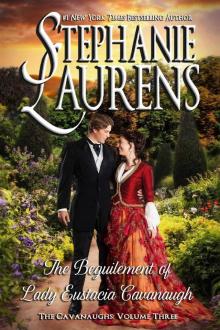 The Beguilement of Lady Eustacia Cavanagh: The Cavanaughs Volume 3
The Beguilement of Lady Eustacia Cavanagh: The Cavanaughs Volume 3 Loving Rose: The Redemption of Malcolm Sinclair (Casebook of Barnaby Adair)
Loving Rose: The Redemption of Malcolm Sinclair (Casebook of Barnaby Adair) By Winter's Light
By Winter's Light Devil's Bride
Devil's Bride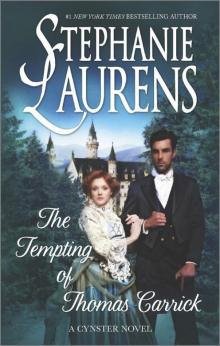 The Tempting of Thomas Carrick
The Tempting of Thomas Carrick![Cynster [22.00] A Match for Marcus Cynster Read online](http://i1.bookreadfree.com/i/03/16/cynster_[22_00]_a_match_for_marcus_cynster_preview.jpg) Cynster [22.00] A Match for Marcus Cynster
Cynster [22.00] A Match for Marcus Cynster All About Love c-6
All About Love c-6 Cobra 01 The Untamed Bride
Cobra 01 The Untamed Bride A Lady of Expectations and Other Stories
A Lady of Expectations and Other Stories By Winter's Light_A Cynster Novel
By Winter's Light_A Cynster Novel And Then She Fell
And Then She Fell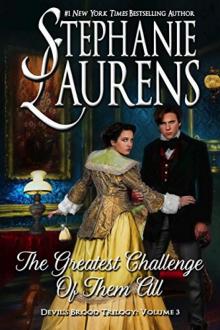 The Greatest Challenge of Them All
The Greatest Challenge of Them All The Edge of Desire
The Edge of Desire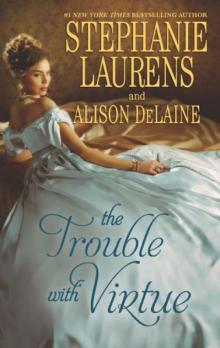 The Trouble With Virtue: A Comfortable WifeA Lady by Day
The Trouble With Virtue: A Comfortable WifeA Lady by Day Fair Juno
Fair Juno THE LEGEND OF NIMWAY HALL: 1750 - JACQUELINE
THE LEGEND OF NIMWAY HALL: 1750 - JACQUELINE Four In Hand
Four In Hand The Reckless Bride
The Reckless Bride Stephanie Laurens Rogues' Reform Bundle
Stephanie Laurens Rogues' Reform Bundle The Untamed Bride Plus Black Cobra 02-03 and Special Excerpt
The Untamed Bride Plus Black Cobra 02-03 and Special Excerpt The Lady's Command (Adventurers Quartet #1)
The Lady's Command (Adventurers Quartet #1) The Seduction of Sebastian Trantor
The Seduction of Sebastian Trantor The Daredevil Snared (The Adventurers Quartet Book 3)
The Daredevil Snared (The Adventurers Quartet Book 3)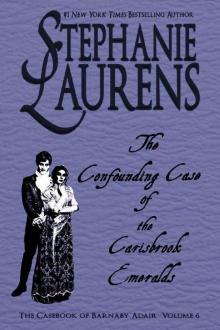 The Confounding Case Of The Carisbrook Emeralds (The Casebook of Barnaby Adair 6)
The Confounding Case Of The Carisbrook Emeralds (The Casebook of Barnaby Adair 6) Lord of the Privateers (The Adventurers Quartet)
Lord of the Privateers (The Adventurers Quartet)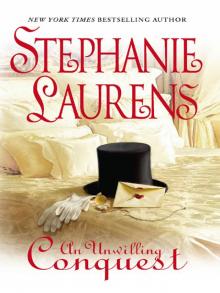 An Unwilling Conquest
An Unwilling Conquest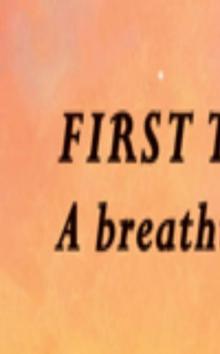 Brazen Bride
Brazen Bride On a Wild Night
On a Wild Night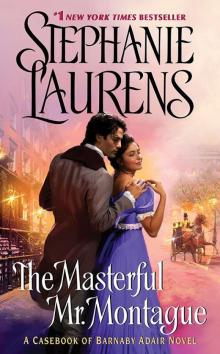 The Masterful Mr. Montague: A Casebook of Barnaby Adair Novel
The Masterful Mr. Montague: A Casebook of Barnaby Adair Novel Lord of the Privateers
Lord of the Privateers Royal Bridesmaids
Royal Bridesmaids Beyond Seduction
Beyond Seduction It Happened One Night
It Happened One Night The Ideal Bride
The Ideal Bride The Promise in a Kiss
The Promise in a Kiss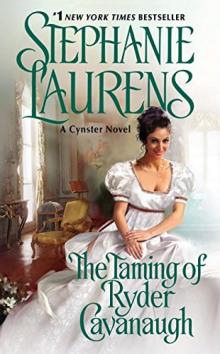 The Taming of Ryder Cavanaugh
The Taming of Ryder Cavanaugh The Ideal Bride c-12
The Ideal Bride c-12 All About Love
All About Love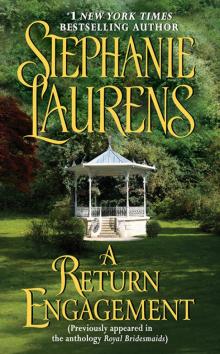 A Return Engagement
A Return Engagement The Untamed Bride Plus Two Full Novels and Bonus Material
The Untamed Bride Plus Two Full Novels and Bonus Material Viscount Breckenridge to the Rescue
Viscount Breckenridge to the Rescue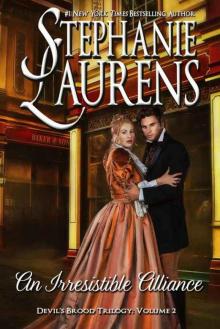 An Irresistible Alliance (Cynsters Next Generation Novels Book 5)
An Irresistible Alliance (Cynsters Next Generation Novels Book 5) The Daredevil Snared
The Daredevil Snared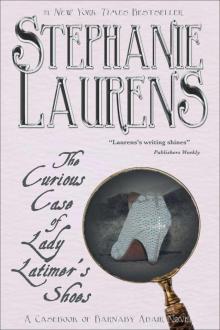 The Curious Case of Lady Latimer's Shoes: A Casebook of Barnaby Adair Novel
The Curious Case of Lady Latimer's Shoes: A Casebook of Barnaby Adair Novel A Lady of Expectations and Other Stories: A Lady of ExpectationsThe Secrets of a CourtesanHow to Woo a Spinster
A Lady of Expectations and Other Stories: A Lady of ExpectationsThe Secrets of a CourtesanHow to Woo a Spinster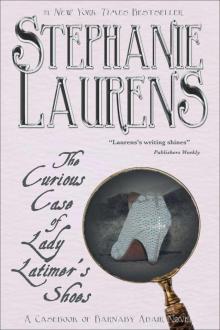 The Curious Case of Lady Latimer's Shoes: A Casebook of Barnaby Adair Novel (The Casebook of Barnaby Adair)
The Curious Case of Lady Latimer's Shoes: A Casebook of Barnaby Adair Novel (The Casebook of Barnaby Adair)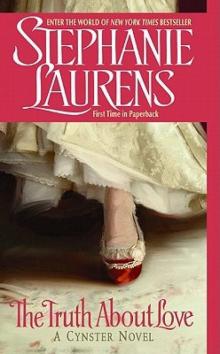 The Truth About Love
The Truth About Love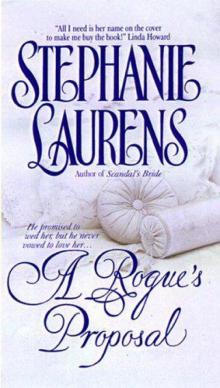 A Rogue's Proposal
A Rogue's Proposal The Elusive Bride
The Elusive Bride The Perfect Lover
The Perfect Lover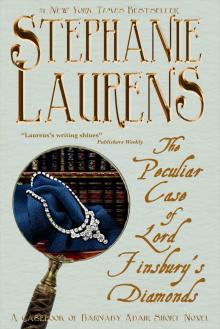 The Peculiar Case of Lord Finsbury's Diamonds: A Casebook of Barnaby Adair Short Novel
The Peculiar Case of Lord Finsbury's Diamonds: A Casebook of Barnaby Adair Short Novel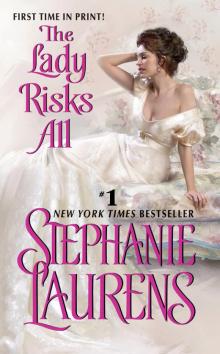 The Lady Risks All
The Lady Risks All The Murder at Mandeville Hall: The Casebook of Barnaby Adair: Volume 7
The Murder at Mandeville Hall: The Casebook of Barnaby Adair: Volume 7 All About Passion
All About Passion A Match for Marcus Cynster
A Match for Marcus Cynster By Winter's Light: A Cynster Novel (Cynster Special Book 2)
By Winter's Light: A Cynster Novel (Cynster Special Book 2) The Lady By His Side
The Lady By His Side The Pursuits of Lord Kit Cavanaugh
The Pursuits of Lord Kit Cavanaugh Tangled Reins
Tangled Reins To Distraction
To Distraction A Rake's Vow
A Rake's Vow A Comfortable Wife
A Comfortable Wife A Lady of His Own bc-3
A Lady of His Own bc-3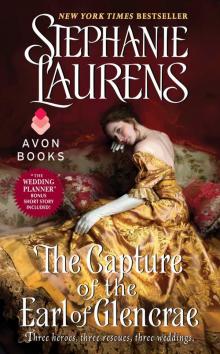 The Capture of the Earl of Glencrae
The Capture of the Earl of Glencrae Scandals Bride c-3
Scandals Bride c-3 Untamed Bride
Untamed Bride The Brazen Bride
The Brazen Bride The Lady By His Side (Cynsters Next Generation Novels Book 4)
The Lady By His Side (Cynsters Next Generation Novels Book 4) Tangled Reins and Other Stories
Tangled Reins and Other Stories Impetuous Innocent
Impetuous Innocent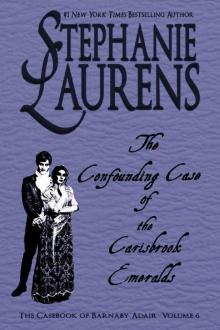 The Confounding Case Of The Carisbrook Emeralds
The Confounding Case Of The Carisbrook Emeralds Stephanie Laurens - B 6 Beyond Seduction
Stephanie Laurens - B 6 Beyond Seduction What Price Love?
What Price Love? A Fine Passion
A Fine Passion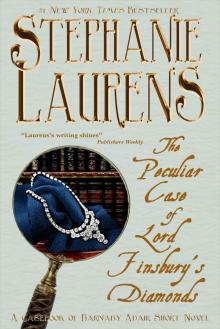 The Peculiar Case of Lord Finsbury's Diamonds: A Casebook of Barnaby Adair Short Novel (The Casebook of Barnaby Adair)
The Peculiar Case of Lord Finsbury's Diamonds: A Casebook of Barnaby Adair Short Novel (The Casebook of Barnaby Adair) Where the Heart Leads
Where the Heart Leads The Designs of Lord Randolph Cavanaugh
The Designs of Lord Randolph Cavanaugh A Secret Love c-5
A Secret Love c-5 On a Wicked Dawn c-10
On a Wicked Dawn c-10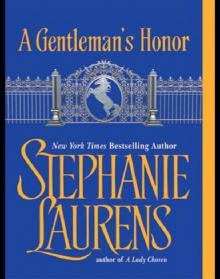 A Gentleman's Honor
A Gentleman's Honor THE LEGEND OF NIMWAY HALL_1750_JACQUELINE
THE LEGEND OF NIMWAY HALL_1750_JACQUELINE A Lady of Expectations
A Lady of Expectations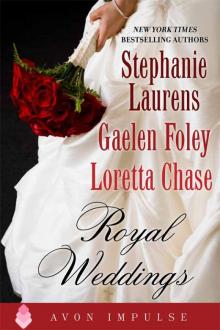 Royal Weddings: An Original Anthology
Royal Weddings: An Original Anthology The Ideal Bride (Cynster Novels)
The Ideal Bride (Cynster Novels) Mastered by Love
Mastered by Love A Buccaneer at Heart
A Buccaneer at Heart Captain Jack’s Woman / A Gentleman's Honor
Captain Jack’s Woman / A Gentleman's Honor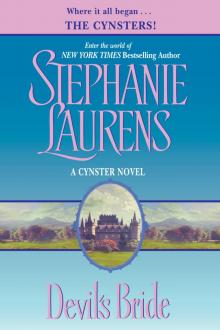 Devil's Bride with Bonus Material
Devil's Bride with Bonus Material A Lady of His Own
A Lady of His Own A Secret Love
A Secret Love Melting Ice
Melting Ice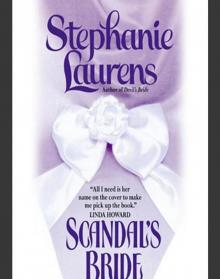 Scandal's Bride
Scandal's Bride Lady Osbaldestone’s Christmas Goose
Lady Osbaldestone’s Christmas Goose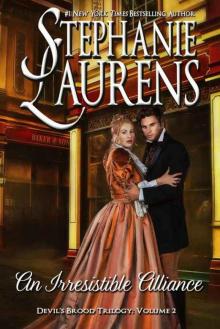 An Irresistible Alliance
An Irresistible Alliance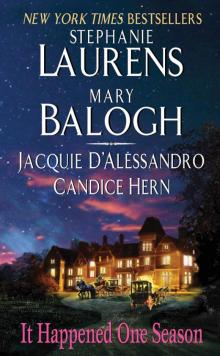 It Happened One Season
It Happened One Season In Pursuit Of Eliza Cynster
In Pursuit Of Eliza Cynster Captain Jack's Woman
Captain Jack's Woman The promise in a kiss c-8
The promise in a kiss c-8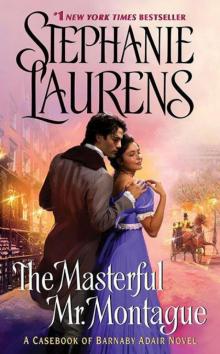 The Masterful Mr. Montague
The Masterful Mr. Montague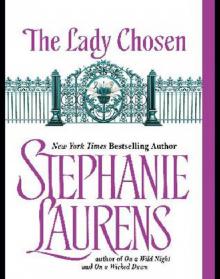 The Lady Chosen
The Lady Chosen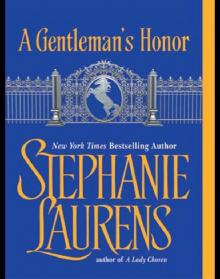 A Gentleman's Honor bc-2
A Gentleman's Honor bc-2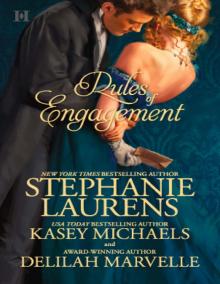 Rules of Engagement: The Reasons for MarriageThe Wedding PartyUnlaced (Lester Family)
Rules of Engagement: The Reasons for MarriageThe Wedding PartyUnlaced (Lester Family) Secrets of a Perfect Night
Secrets of a Perfect Night The Taste of Innocence
The Taste of Innocence On A Wicked Dawn
On A Wicked Dawn The Untamed Bride
The Untamed Bride A Rogues Proposal c-4
A Rogues Proposal c-4 Rakes Vow c-2
Rakes Vow c-2 Devils Bride c-1
Devils Bride c-1 Hero, Come Back
Hero, Come Back On a Wild Night c-8
On a Wild Night c-8 All About Passion c-7
All About Passion c-7